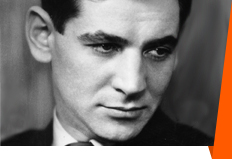
NOTES ON THE PIECES
- Leonard Bernstein
- Arias and Barcarolles
- Halil
- Concerto for Orchestra (Jubilee Games)
- Mass
- On the Town
- Prelude, Fugue and Riffs
- Serenade (After Plato’s Symposium)
- Symphony No. 1, “Jeremiah”
- Symphony No. 2, “The Age of Anxiety”
- Symphony No. 3, “Kaddish”
- West Side Story Suites
Symphony No. 2, “The Age of Anxiety”
Anyone who grew up in America in the late 1950s probably first encountered classical music through a series of Young People’s Concerts, presented on television by Leonard Bernstein. Bernstein’s gently narrated, eloquent descriptions examined many aspects of his art.
Excerpt from Bernstein’s Symphony No. 2, “The Age of Anxiety” (Part Two: b. The Masque: Extremely Fast)
New York Philharmonic / Leonard Bernstein, Conductor; Lukas Foss, Piano. Sony Classical SK 60558.
Find this and more of Leonard Bernstein’s work at ArkivMusic.com ›
One program explained that music, in itself, is never “about” anything but music. For his example, Bernstein chose the tone poem Don Quixote by Richard Strauss, specifically Variation 2, in which the Don meets a flock of sheep on the road and believes them to be soldiers. Before playing the episode, however, Bernstein created a fanciful story about a group of motorcycle riders, and allowed the music graphically to illustrate a completely different idea. His point was made.
In 1947, W. H. Auden published an epic poem, The Age of Anxiety, concerned with 20th-century man’s search for God. The poem won a Pulitzer Prize, and Bernstein, deeply moved, chose it as the subject matter for a symphony. He added a solo piano part, representing himself as a spectator. The story concerns four disenchanted people searching for faith, and Bernstein composed music to illustrate the descriptions on the printed page. At the end, after a jazz interlude for piano and percussion, “the characters disperse,” and an Epilogue, for orchestra alone, represents faith itself. Later, Bernstein rewrote the finale, adding a cadenza before the coda to round out the work’s concert function. In other words, he followed his own maxim about music not being related to anything except itself. The music had acquired a life—and a separate personality—of its own, despite the words that inspired it.
—Paul Myers
Paul Myers, a classical record producer for more than 40 years, is the author of several books, including a biography of Leonard Bernstein (Phaidon).
© 2001–2008 Carnegie Hall Corporation
- Home
- |
- Multimedia
- |
- Press
- |
- Partners
- |
- Supporters





